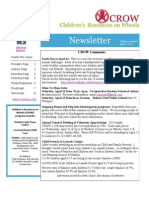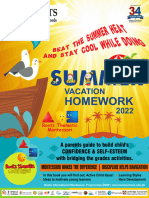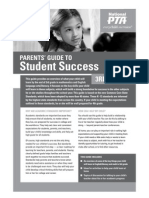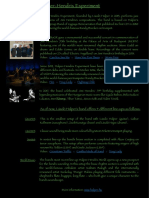Hs Eng
Hs Eng
Uploaded by
api-32541207Copyright:
Available Formats
Hs Eng
Hs Eng
Uploaded by
api-32541207Original Title
Copyright
Available Formats
Share this document
Did you find this document useful?
Is this content inappropriate?
Copyright:
Available Formats
Hs Eng
Hs Eng
Uploaded by
api-32541207Copyright:
Available Formats
Home&School
Working Together for School Success
December 2012
CONNECTION
Title I Program
Washoe County School District
My journal
Suggest that your child keep a winter-break journal. Each day, he can draw and write about something he did, like sledding with cousins or watching football. This will help his writing skills stay sharp while school is out. Encourage him to add to his journal each yearhe can reread old entries to enjoy favorite winter memories.
Ready for recess
Knowledge is everywhere
Whether you and your youngster are folding laundry, waiting for the bus, or going to the bank, there is something new for her to learn. Take advantage of everyday experiences to build background knowledge that she can draw on in school. Heres how.
In the house
Your youngsters class probably goes out for recess every day unless its raining or snowing. Make sure she keeps gloves and a hat in her backpack so she can stay warm while she plays. She might also wear leggings under dresses, and layers that she can remove if she gets too hot indoors.
Point of view
Show your child that people often see the same things differently. Let everyone look at a magazine photo for 35 seconds. Then, ask each person to share the first thing he saw, such as the shiny new car or the sunset in the background. Explain that peoples experiences and interests affect what they notice or pay attention to.
Worth quoting One kind word can warm three winter months. Japanese proverb
Help your child make discoveries while you do chores together. When you fold laundry, have her read the tags. Ask her what materials the clothes are made of (cotton, polyester) and which countries they come from (China, Vietnam). Later, she can find the countries on a map. Or if youre cooking dinner, let her hand you the spices. Talk about how they smell and taste (Chili powder is spicy. Cinnamon is sweet).
Around the neighborhood
What kinds of flowers do you sell? When you have guests, invite them to talk about what life is like where they live. Say you are in the country and they are from a citythey might describe riding the subway or working in a skyscraper.
Out and about
Everyone your youngster meets can teach her something new. Chat with neighbors while taking a walk or waiting at the bus stop. If someone mentions an interesting job (pilot, florist), encourage your child to ask questions. Examples: How did you learn to fly a plane? or
Your community is full of learning opportunities. At a hardware store, point out tools (wrench, drill) and talk about what theyre for. If youre at the bank drive-thru, let your youngster put your deposit in the canister and watch it go through the vacuum tube. Also, try to find new places to go. Visit a nature center, for example, and have your youngster read the displays to see what lizards and turtles eat.
Helping the teacher
An extra pair of hands is a gift that teachers appreciate any time of year. And helping out is one way to show your child that his education is important to you. Consider these tips: Let the teacher know what you enjoy doing. If youre a scrapbooker, she might have you use your creativity to decorate bulletin boards. If you like math, she could ask you to help a small group with a game. Do you work during the day? Ask the teacher about evening activities you can participate in. You might help organize a parent-child book club or make flyers for the school talent show.
JUST FOR FUN
Q: What do monkeys have that no other animal has? A: Baby monkeys.
2012 Resources for Educators, a division of CCH Incorporated
Home & School CONNECTION
December 2012 Page 2
might give him a healthy snack so he wont get hungry and cranky. You could also assign him a special job so he has something fun to focus on. For instance, get a mall map from the information desk, and ask him to locate stores. Or let him read the list of people youre shopping for and make gift suggestions.
Respond carefully. When your child does misbehave, try to
Set the stage for good behavior
What if you could spend less time disciplining your child and more time enjoying his company? Try these suggestions to encourage good behavior and to be prepared when he does act out.
Think ahead. With a little planning,
you can make it easier for your youngster to behave well. Before you go shopping, you
Lets make music!
A family sing-along is a fun way for your youngster to explore music. Get started with these ideas: turns teaching each other songs. Your child might pick one she learned in school, and you could select one that you remember from childhood. Idea: Try Row, Row, Row Your Boat or Three Blind Mice in rounds. Let your youngster start, and after she sings the first line, you sing from the beginning while she continues the song. Shell need to listen carefully to keep her place!
Take
pick consequences that you can stick with. If hes throwing a ball indoors during a family gathering, going home right away might not be reasonable. Instead, you could take the ball away and have him find something else to do. If you follow through, he will be more likely to listen next time.
Learning how to study
Q: My daughter has more tests and quizzes this year. How
can I help her use good study habits so she can do well?
A: Studying is a skill that your daughter can learn and prac-
tice. First, have her get into the habit of studying a little each day. That way, she wont need to cram the night before a test or quiz. An evening when she doesnt have much homework is a good time to look over class notes or review multiplication facts, for example. Also, encourage your child to experiment with different study methods. She might read a science or social studies chapter out loud. She could even record herself and play it back. Or suggest that she use different colored pens to underline or circle parts of spelling words that trip her up (receive, chief). Trying different strategies will help her find the ones that work best for her.
Make musical instruments to accompany your songs. Your child can play different types, like percussion (drums, tambourine), wind (flute, harmonica), and string (guitar, violin). For example, a wooden spoon on an oatmeal canister or a coffee can makes a good drum. Or help her create a guitar by wrapping rubber bands of different widths around an empty tissue box. O U R P U R P O S E
Family community service
Our older son, Ryan, does community service for high school credit. Recently, our third-grader, Matt, asked if he could volunteer, too. Ryan asked his civics teacher, who recommended a project that we could all do. We met a group at the library to make care packages for families who lost their homes in a hurricane. The packages included things like soap, toothpaste, cereal, and soup, and our job was to make sure every box got one of each item. Ryan told Matt he was doing a great job, and he pointed out how grateful the families would feel when they received their packages. Afterward, Ryan and Matt wanted to do another project together. We checked a few websites, including unitedway.org and volunteermatch.org, and found quite a few family volunteer opportunities in our area. Matt is excited about working with his big brother, and Im happy that hes learning at a young age about helping others.
To provide busy parents with practical ideas that promote school success, parent involvement, and more effective parenting. Resources for Educators, a division of CCH Incorporated 128 N. Royal Avenue Front Royal, VA 22630 540-636-4280 rfecustomer@wolterskluwer.com www.rfeonline.com ISSN 1540-5621
2012 Resources for Educators, a division of CCH Incorporated
You might also like
- ENGLISH FILE. End-Of-course Test. New. Beginner. 1 Complete The Sentences With One Word.Document6 pagesENGLISH FILE. End-Of-course Test. New. Beginner. 1 Complete The Sentences With One Word.Ēstrëllã Åbîr75% (4)
- Learning Around The House: ConnectionDocument2 pagesLearning Around The House: ConnectionMurray County Central SchoolsNo ratings yet
- September 2014Document2 pagesSeptember 2014api-261444430No ratings yet
- Home and School Connection Mar 2015Document2 pagesHome and School Connection Mar 2015api-261370400No ratings yet
- December 2014Document2 pagesDecember 2014api-261444430No ratings yet
- March 2015Document2 pagesMarch 2015api-261444430No ratings yet
- Counselors Corner Nov 2016Document4 pagesCounselors Corner Nov 2016api-336513704No ratings yet
- Hs Eng 3Document2 pagesHs Eng 3api-32541207No ratings yet
- Hs Eng 1Document2 pagesHs Eng 1api-32541207No ratings yet
- HSC 9 14 EnglishDocument2 pagesHSC 9 14 Englishapi-237341825No ratings yet
- Read-Alouds Build Readers: KID BitsDocument2 pagesRead-Alouds Build Readers: KID BitsAnonymous GAU7ZZ5100% (1)
- Holiday Homework 2019 KGII Final 1Document54 pagesHoliday Homework 2019 KGII Final 1Muhsina GowthNo ratings yet
- Home&School: Critical ThinkingDocument2 pagesHome&School: Critical Thinkingapi-239432862No ratings yet
- September 2015 Early YearsDocument2 pagesSeptember 2015 Early YearsAnonymous GAU7ZZ5No ratings yet
- How To Prepare Your Child For 1st GradeDocument13 pagesHow To Prepare Your Child For 1st Gradeapi-259588367No ratings yet
- Middle Years Oct 2012Document2 pagesMiddle Years Oct 2012Angela CarterNo ratings yet
- SCWMS FebDocument2 pagesSCWMS FebNathaniel Collins OrtizNo ratings yet
- CROW Newsletter AprilDocument8 pagesCROW Newsletter AprilAlmonteHighSchoolNo ratings yet
- Early Years Sept 14Document2 pagesEarly Years Sept 14api-261370400No ratings yet
- The Good Behavior Toolbox: KID BitsDocument2 pagesThe Good Behavior Toolbox: KID BitsAnonymous GAU7ZZ5No ratings yet
- Activity Ideas For Middle School StudentsDocument3 pagesActivity Ideas For Middle School Studentspace_saNo ratings yet
- Support CHN LearningDocument6 pagesSupport CHN Learningapi-250454015No ratings yet
- Summer Calendar Elem EngDocument2 pagesSummer Calendar Elem Engapi-32541207No ratings yet
- H Scsept16Document2 pagesH Scsept16api-263338988No ratings yet
- 52 Ways To Help Your Child LearnDocument8 pages52 Ways To Help Your Child LearnAnkit1402No ratings yet
- Summer Book LetDocument32 pagesSummer Book LetFatima R, Hiba, HuzaifaNo ratings yet
- Helping Your Child Succeed in SchoolDocument13 pagesHelping Your Child Succeed in SchoolJACKSON OSUHNo ratings yet
- 'S LearningDocument6 pages'S LearningJanine ReadNo ratings yet
- Home and School Connection Nov 2014Document2 pagesHome and School Connection Nov 2014api-261370400No ratings yet
- How to Start the School Year RIGHT!: 5 Simple Steps to a Great BeginningFrom EverandHow to Start the School Year RIGHT!: 5 Simple Steps to a Great BeginningNo ratings yet
- Home & School Connection Feb 15Document2 pagesHome & School Connection Feb 15api-261370400No ratings yet
- Manage Your Time Wisely: ConnectionDocument2 pagesManage Your Time Wisely: ConnectionMurray County Central SchoolsNo ratings yet
- February 2015Document2 pagesFebruary 2015api-261444430No ratings yet
- First Grade News: Curriculum HighlightsDocument4 pagesFirst Grade News: Curriculum HighlightsmonicatindallNo ratings yet
- Winter Break Winter Break: Survival KitDocument29 pagesWinter Break Winter Break: Survival KitTatjana Panovska100% (1)
- 1314 HandbookDocument9 pages1314 Handbookapi-162642455No ratings yet
- Make The Most of Playtime: Does This Sound Familiar?Document6 pagesMake The Most of Playtime: Does This Sound Familiar?lara_2772No ratings yet
- Elemwin13cal1 1Document2 pagesElemwin13cal1 1api-32541207No ratings yet
- Homeschooling TipsDocument3 pagesHomeschooling TipsjusraNo ratings yet
- Love Reading: How to Help Your Child Improve Their Reading Skills.From EverandLove Reading: How to Help Your Child Improve Their Reading Skills.No ratings yet
- HSC 10 14 EnglishDocument2 pagesHSC 10 14 Englishapi-237341825No ratings yet
- Toddlers Very Early LearningDocument2 pagesToddlers Very Early LearningKrittiya Permpanich100% (1)
- October 2014Document2 pagesOctober 2014api-261444430No ratings yet
- Rockport Elem. News: Dates To RememberDocument5 pagesRockport Elem. News: Dates To Rememberapi-265655339No ratings yet
- November 2014Document2 pagesNovember 2014api-261444430No ratings yet
- Class Nursery Summer Holidays HomeworkDocument18 pagesClass Nursery Summer Holidays HomeworkrishiNo ratings yet
- February 2015 - Helping Students LearnDocument2 pagesFebruary 2015 - Helping Students Learnpic4594No ratings yet
- Kindergarten Handbook 8-27 With CoverDocument7 pagesKindergarten Handbook 8-27 With Coverapi-260739043No ratings yet
- 3rdGradeTips EnglishDocument19 pages3rdGradeTips EnglishLacy HarbisonNo ratings yet
- ASQ 3 Learning Activities PacketDocument5 pagesASQ 3 Learning Activities PacketVangieNo ratings yet
- Holiday Homework 2020-21 KINDERGARTENDocument27 pagesHoliday Homework 2020-21 KINDERGARTENIshaNo ratings yet
- Curriculum Night 14-15Document7 pagesCurriculum Night 14-15api-262416087No ratings yet
- Our Family's Rules: ConnectionDocument2 pagesOur Family's Rules: ConnectionMurray County Central SchoolsNo ratings yet
- Fun Homework Ideas Year 5Document7 pagesFun Homework Ideas Year 5afeufjxsq100% (1)
- Preschool Homework BagsDocument4 pagesPreschool Homework Bagsafetksere100% (1)
- Helping 11 Year Old With HomeworkDocument8 pagesHelping 11 Year Old With Homeworkewbqyj94100% (2)
- 12-24 Months Olds ActivitiesDocument4 pages12-24 Months Olds Activitiessrushtighadge1995No ratings yet
- Auditory Processing ExercisesDocument7 pagesAuditory Processing ExercisesRaghaveni RVNo ratings yet
- Summer Calendar Elem EngDocument2 pagesSummer Calendar Elem Engapi-32541207No ratings yet
- WCSDPF Mitchell 4Document1 pageWCSDPF Mitchell 4api-32541207No ratings yet
- Rfs Eng 3Document2 pagesRfs Eng 3api-32541207No ratings yet
- June Elem Calendar EngDocument1 pageJune Elem Calendar Engapi-32541207No ratings yet
- Rfs Eng 2Document2 pagesRfs Eng 2api-32541207No ratings yet
- Hs Eng 1Document2 pagesHs Eng 1api-32541207No ratings yet
- Hs Eng 3Document2 pagesHs Eng 3api-32541207No ratings yet
- Rfs Eng 1Document2 pagesRfs Eng 1api-32541207100% (1)
- Math Grade 1Document6 pagesMath Grade 1api-32541207No ratings yet
- Math KDocument6 pagesMath Kapi-32541207No ratings yet
- Elemwin13cal1 1Document2 pagesElemwin13cal1 1api-32541207No ratings yet
- 4th Grade-EnglishDocument4 pages4th Grade-Englishapi-32541207No ratings yet
- Math Grade 2Document6 pagesMath Grade 2api-32541207No ratings yet
- 1st Grade - EnglishDocument4 pages1st Grade - Englishapi-32541207No ratings yet
- 100282-000parentguide Ela 6Document6 pages100282-000parentguide Ela 6api-32541207No ratings yet
- 3rd Grade-EnglishDocument4 pages3rd Grade-Englishapi-32541207No ratings yet
- Student Success: Parents' Guide ToDocument4 pagesStudent Success: Parents' Guide Toapi-32541207No ratings yet
- Step Myitv7Document5 pagesStep Myitv7skbt2014No ratings yet
- 03 - Violin - Listen To The WindDocument2 pages03 - Violin - Listen To The WindJohnson Joseph WilsonNo ratings yet
- 10 Reflective Studies - Stefano VivaldiniDocument50 pages10 Reflective Studies - Stefano VivaldiniCamilo Sánchez100% (1)
- List of Authors Other Owners For Disclosure Report 30th Jun 2024Document862 pagesList of Authors Other Owners For Disclosure Report 30th Jun 2024redmitalkgmNo ratings yet
- 10 Massive Pop Stars Who Secretly Appeared On Rock and Metal SongsDocument163 pages10 Massive Pop Stars Who Secretly Appeared On Rock and Metal SongsJohnJacob316No ratings yet
- Minor D Mateusz ChmielDocument2 pagesMinor D Mateusz Chmielmateusz.chmiel03No ratings yet
- 3rd Quarter Exam in MAPEH 5Document2 pages3rd Quarter Exam in MAPEH 5Adriano GapuzNo ratings yet
- Remember - Mateiu CaragialeDocument1 pageRemember - Mateiu CaragialeJoanna BulgacovNo ratings yet
- Herz - MethodDocument170 pagesHerz - Methodcharlzjin9700100% (1)
- Mapeh 6 q3 Music Mod2Document37 pagesMapeh 6 q3 Music Mod2glennbondocNo ratings yet
- BME Instrumental Tutor's Name List - 030910Document3 pagesBME Instrumental Tutor's Name List - 030910lacampanellalaNo ratings yet
- Come Thou Fount of Every BlessingDocument1 pageCome Thou Fount of Every BlessingSÁNDOR BENCZE ERDEINo ratings yet
- 121 Final Study GuideDocument2 pages121 Final Study GuideKamrynC.BurtonNo ratings yet
- O Ciúme Partitura PDFDocument4 pagesO Ciúme Partitura PDFThiago Morais FelixNo ratings yet
- Bahasa Inggris CBT 1Document12 pagesBahasa Inggris CBT 1Agnes Dara NinggarNo ratings yet
- We Wish You A Merry ChristmasDocument2 pagesWe Wish You A Merry ChristmasThanhLoan TranNo ratings yet
- Justin-Tyme - Sheet MusicDocument3 pagesJustin-Tyme - Sheet Musicmjw61No ratings yet
- SH'BAM 23 Choreography BookletDocument24 pagesSH'BAM 23 Choreography BookletSergio MenorNo ratings yet
- JokesDocument11 pagesJokesShubham SharmaNo ratings yet
- SuperunknownDocument12 pagesSuperunknowna ZuNo ratings yet
- Judul Lagu - Band: The Day You Went Away - M2m Posted byDocument5 pagesJudul Lagu - Band: The Day You Went Away - M2m Posted byaloner_whyNo ratings yet
- Kojo No Tsuki - 80Document2 pagesKojo No Tsuki - 80annaNo ratings yet
- Judith Becker - Music and TranceDocument12 pagesJudith Becker - Music and Trancevals100% (1)
- Present Perfect TenseDocument2 pagesPresent Perfect TenseTuğba ÖzçelikNo ratings yet
- Mapeh 8 Test Questions 2nd QuarterDocument6 pagesMapeh 8 Test Questions 2nd QuarterJarnel CabalsaNo ratings yet
- MusicDocument1 pageMusicPhương LinhNo ratings yet
- WEXMAN, Virginia - The Rhetoric of Cinematic ImprovisationDocument14 pagesWEXMAN, Virginia - The Rhetoric of Cinematic ImprovisationMarcel SoaresNo ratings yet
- Lavender TownDocument2 pagesLavender TownRichardNo ratings yet
- Creep PMJ-Alto - 1Document1 pageCreep PMJ-Alto - 1andrewfriday21No ratings yet






































































































